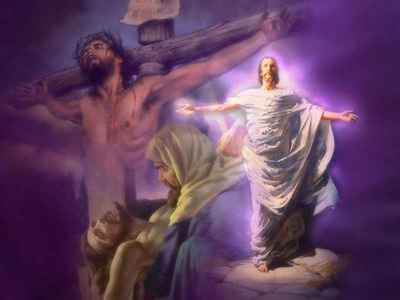Twenty-second Sunday in Ordinary Time
September 3, 2023 — Year A
Readings: Jer 20:7-9 / Ps 63 / Rom 12:1-2 / Mt 16:21-27
by Rev. Nixon Negparanon, Pastor
A nun was explaining the Stations of the Cross to her class. They got to the fourth station where Jesus, on the road to Calvary, meets His mother. The nun explained that even though they could not talk to each other, the mother and son spoke to each other just using their eyes. “What do you think they said to each other?” she asked the pupils. The class gave many answers. One said that Mary said, “This isn’t fair.” Another said that she said, “Why me?” Finally, a sick little girl raised her thin hand, got up, and said, “Sister, I know what the Blessed Mother told Jesus. She said to Him, ‘Keep on going, Jesus.’ Why would a mother encourage her only son on the way to crucifixion, to keep on going? Because she understood the Christian principle of no cross, no crown.”
The image of Jesus Christ crucified is so important for our liturgical life that the Church requires that the crucifix be on or close to the altar at every Mass. It should be the focal point of the Christian life. All three of today’s scripture readings, with their emphasis on suffering and sacrifice, help us regain a proper appreciation of the crucified Christ and of the place of the cross in our Christian lives.
Jesus Christ proves to us how much God loves us by suffering and dying on the cross, that we may have eternal life. The greatest expression of Christ’s love is the laying down of His life on the cross. The very center of His mission is His death and resurrection for the life of the world. We can recall that St. Paul declared, “May I never boast except in the cross of our Lord Jesus Christ through which the world has been crucified to me and I to the world (Gal 6:14).”
Peter, James, and John have just left the sweet, reassuring, hallowed experience of the Transfiguration. How thrilling religion can be! How comforting for the heart. Just when the apostles are wallowing in pleasant religious feelings, Jesus grows stern and tells them about His forthcoming cross. Peter will have none of it and tells Jesus that this is for others, not Him and them. Jesus, without missing a beat, cuts Peter with quickness by saying, “Get behind Me, Satan!”
Peter needed divine intervention to know that Jesus was divine at Caesarea Philippi. Now he needs divine illumination again to understand that the nice feelings at Tabor are only bought with the dreadful feelings of Calvary. You can sense the fire in Jesus’ heart as He speaks in glowing terms about the cost of following Him. Of course, He knows where everything is heading: Jerusalem and Golgotha, the grave and beyond. His disciples are not as clear about the direction they are headed, but not for lack of hearing about it. Peter actually takes Jesus aside and tells Him that this talk of suffering and death is inappropriate. This should be the hour of victory, but Jesus insists on making the opportunity in front of them strangely grim.
Following Jesus is not a walk in the park. It will not lead to a comfortable position sitting on His right or His left, but rather a taste of the cup from which He is to drink. If we believe in Jesus and are willing to risk a love like His, then we have to be prepared for what the world does to truth-speakers like Him.
Perhaps, like Peter, we may be losing sight of our purpose in life. It is not to live totally for pleasure and avoid as many crosses as possible. Rather, it is to live it in such a way so as to merit the reward of eternal life. It is about living our few years in this life in a way that will reap for us the reward of eternal life in the next life. More concretely, it is about picking up our crosses daily and accepting them in the same spirit that Jesus accepted His own cross. The remarkable part is that once we begin living as Jesus taught us to live, everything will turn upside down. Suddenly, what seemed to be an enormous cross, will turn out to be, in the light of this world and the next world, an enormous blessing.
Suffering then, is not an end in itself. It is a pathway to glory. Jesus has taken on the full weight of human suffering and has transformed it, giving it life-giving value. This is why we willingly display the crucifix instead of rejecting it. While we try to alleviate suffering through legitimate means, at the same time we strive to see it from God’s perspective to find its deeper meaning. When we look at a crucifix, we are reminded that God does not see suffering as something to be avoided at all costs. He knows how to bring good out of suffering.
St. Paul knows that the idea of sacrifice, which is voluntary suffering, does not fit the world’s way of thinking. We are no longer to think as the world does or judge by the world’s standards. Rather, we are called to be transformed by the renewal of our minds so that we may discern what is the will of God: what is good, pleasing, and perfect.
To be able to do this, we need to fix our gaze on Jesus Christ or the crucified Christ. He is risen, but His cross and His passion are our strength. The way of perfection passes by way of the cross. Living by God’s will, no matter what form the cross may take in our lives, is what leads to our glory with Him.
 540-586-8988
540-586-8988 

